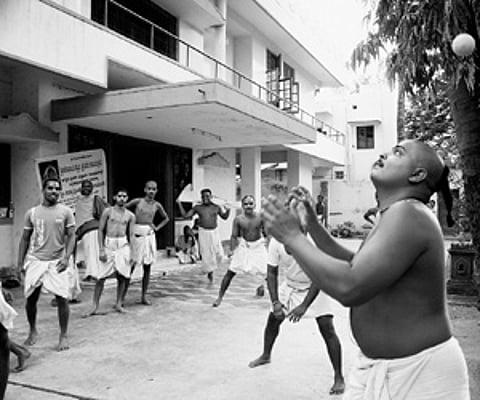

BANGALORE: In an age when being selected for prestigious foreign educational institutions, including those belonging to the Ivy League, is becoming the life goal of more and more students, one would have thought that institutions teaching traditional knowledge are passe. But a visit to the Jayateertha Vidyapeetha will belie such notions and prove that studies of ancient Indian texts are alive and kicking, even in a ‘modern’ city like Bangalore.
Situated just a few yards away from the National High School, the Vidyapeetha is run by the Uttaradi Mutt, belonging to the Dwaita tradition founded by the 13th century saint Madhwacharya.
In an age when even kindergarten admissions cost upto Rs 1 lakh, providing education for 12 long years, with free food, accommodation, hot water for bathing, books, clothes and medicines is indeed a noble service. What more, regular financial assistance is given to parents of students from poor families.
Objectives
The major objective is to prepare students who would become the torchbearers of our age-old traditions and knowledge in general, and inheritors of Madhwa philosophy in particular.
The institution is silently inching closer to its silver jubilee year. What started as a small experiment at ‘Vidya Mandira’ in N R Colony, has today grown into an institution that now has 180 students.
Here, you won’t find conventional classrooms. But students huddled in groups, learning different subjects. The teacher introduces to them the nuances of the subjects, paying individual attention.
Career options
What are the career options for the students, once they pass out? Says Satyadhyanacharya Katti, the principal, “We prepare the students in such a way that they can lead a decent life once they pass out. Students either get into research, deliver lectures for the public on the puranas and Madhwa philosophy, train students at home, get into priesthood, take to astrology or author books, depending on their inclinations.” “Students are not so familiar with traditional ways of life when they come here. But by the time they pass out, they are well-versed in matters traditional and spiritual,” he says, adding that there have been instances when students on going back home, have changed the lifestyles of parents, putting them on the spiritual path.
Curriculum Children usually join the institution at the age of eight, and are first introduced to the rudimentaries of Sanskrit.
Then they are taught grammar, the puranas, Dwaita Vedanta, tarka, itihasa, nyayashastra, sahitya, meemamsa and other subjects.
The next stage is what may be called specialisation, with students concentrating on either priesthood studies, astrology or advanced works like the 37 ‘Sarvamoola Granthas’ authored by Madhwacharya, the Sri Sudha, a treatise authored by Sri Jayateertharu and works authored by other saints on Dwaita philosophy.
Such students are the ones who go on to do research. The institute also gives an opportunity for students to write MA (Sanskrit) exams of various universities.
SSLC being a necessary qualification for MA, the Vidyapeetha also facilitates the students to take up SSLC exams as private candidates. Classes in maths and basic English are held to help them in this regard. They are also taught the basics of computers. There are around 20 teachers for different subjects.
Vidwat sabhas
An interesting feature of the learning process is that ‘vidwat sabhas’ are held in the Vidyapeetha every fortnight.
This way they get the practice of speaking in public platforms. Such debate sessions are also held on an interinstitution basis, in which other Vidyapeethas like Poornaprajna Vidyapeetha also participate. Besides, students participate in ‘sabhas’ at different institutions in the country, on philosophies like Dwaita, Adwaita and Vishishtadwaita.
The Vidyapeetha has a disciplining policy that is not draconian, yet effective.
It follows the sama, daana, bheda, danda policy of disciplining methods (roughly translated, the methods are kindness, cajoling, comparing with the good ones and finally physical punishment).
The incorrigible ones are sent home.
Examination system
Exams are conducted at the end of all four trimesters in an year. The number of papers varies for different classes.
While the maximum marks for each paper is 50 for first and second trimesters, the same is 75 and 100, for third and fourth trimesters respectively. Oral exams are also held. The parents are sent the report card at the end of each trimester.
Strictly indoors
The students are not let out of the premises, except for going home once in a while. Parents or relatives can visit the students in the Vidyapeetha premises itself. Students from across Karnataka, as also some from Tamil Nadu, Andhra Pradesh and Maharashtra study here. The Vidyapeetha has branches in Hubli, Raichur, Chennai, Tirukoilur and Hyderabad. It is also home to a well-stocked library of books and manuscripts, besides the Dwaita Studies and Research Foundation.
Accomplishments of students
PhDs from the Rashtriya Sanskrit Sansthan, Delhi, as also the Rashtriya Sanskrit Vidyapeetha in Tirupati and the Sampoornanand University in Varanasi.